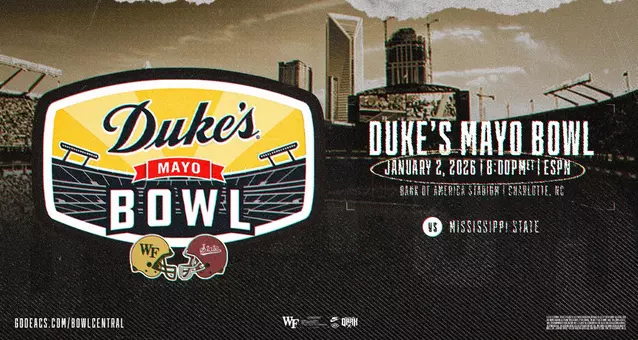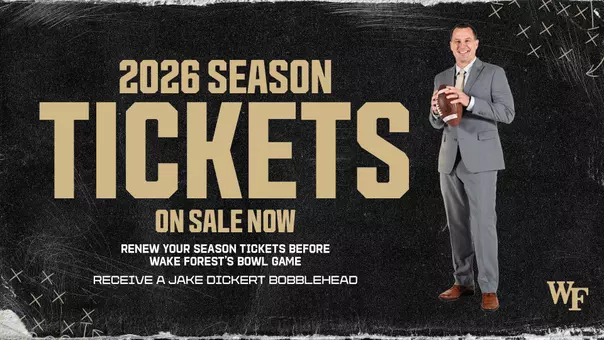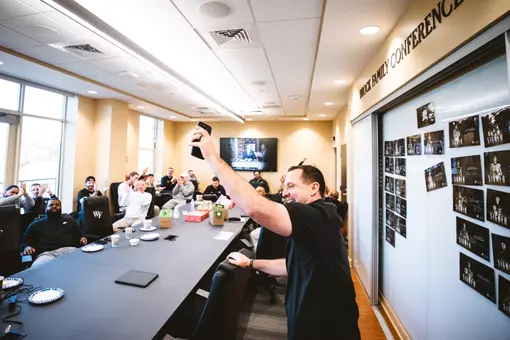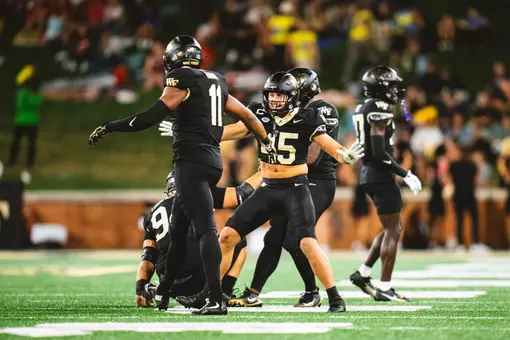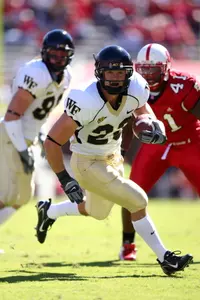
Gold Rush Feature: From Game Day to Race Day
10/21/2011 12:00:00 AM | Football
Oct. 21, 2011
This article was originally published in the September 2011 edition of Gold Rush.
By Jay Reddick
Many student-athletes come to college with dreams of playing in the pros one day. For a few Wake Forest alumni, that dream has come true -- but not in the way they originally imagined.
They're members of NASCAR pit crews, the guys you see jump over the walls in firesuits every weekend, 10 months a year, carrying tires, or jacks or wrenches. And there are more Deacons in their ranks than you might think.
Kevin Harris, who was carrying a football at BB&T Field just two years ago, is now carrying tires for Hendrick Motorsports. Dion "Rocko" Williams, who also works for Hendrick, was featured on an episode of CBS' "Undercover Boss" last year. And at least half a dozen more can be found in the race shops around Charlotte in any given week.
The drivers may get the glory, but there's no question that NASCAR is a team sport, and the pit crew plays a crucial role. And now more than ever, its members are athletes.
Legendary chief and owner Ray Evernham is often credited with the idea of putting pit crews through strength and agility training, as part of Jeff Gordon's "Rainbow Warriors" crew in the mid-1990s. Over time, that meant recruiting former college and professional athletes to work, whether they had racing experience or not.
"The old-school thinking was that the pit crews were full of guys who had turned wrenches their whole lives," said Nate Bolling, a former Wake Forest defensive lineman who works as a jack man for Joe Gibbs Racing. "There were a couple of crews who got them out of there, who moved over to guys with a more athletic background. Those teams started whooping everybody, and others caught on."
The Wake Forest connection started in the early 2000s. Former linebacker Matt Myers, a tire-carrier for Mark Martin's team with Hendrick, was one of the first, but others have been around long enough to become trusted veterans.
Bolling had as good an athletic background as you could want. He spent two years as a defensive lineman with the Baltimore Ravens and another with Miami but decided in 2004 that he would jump out of the NFL before he was pushed.
"I could tell I was about to get cut by the Dolphins," Bolling said. "My wife and I had talked about moving back to North Carolina. I heard that race teams were hiring former athletes, so I started making calls."
Bolling, like many others, said the chance to remain in sports was a big lure for him.
"I knew I could never do a 9-to-5 job," Bolling said. "I also knew that I like the thrill of competition -- even if I'm changing a diaper, I want to do it faster than anybody. So I thought this would be a good way to make a living, and a good way to try to win."
NASCAR certainly isn't 9-to-5, but it isn't just a weekend job, either. Each member of the crew has another duty within the shop.
Bolling spends Monday through Thursday mornings loading boxes in the shipping department at Joe Gibbs Racing. His afternoons are spent at pit-stop practice and strength/agility training (up to two hours each, per day). Friday and Saturday are rest days, and Sundays are a blur of plane flights, garage setup and race work that can take up to 20 hours.
"I compare it to the Carolina Panthers," said Doug Riepe, a 2004 baseball alumnus who now works on Jamie McMurray's Sprint Cup crew. "Imagine if you had to fly to the stadium, set up the bleachers, line the field, get the uprights and the pylons just right, then play the game, then fly home. Now do that 38 weeks a year. That's what we do."
Riepe is another who had a quick rise through the sport, working in Sprint Cup just a year after signing a development deal with Earnhardt Ganassi Racing. He was working as a sports marketing intern with ISP Sports when he got a call from then-WFU strength coach Matt Jennings and decided to give NASCAR a shot.
Riepe is taking advantage of his marketing background for his "day job" with the race team, managing relationships with the primary sponsors on Earnhardt Ganassi's Sprint Cup cars.
"I didn't get a marketing degree just to go to work on a pit crew," Riepe said. "I enjoy doing this -- marketing race cars is a lot sexier than marketing typewriters. And you never know when the physical side of the job will be over, so hopefully I'm set for the future."
Riepe's former roommate and baseball teammate, Eric Maycroft, has also joined the marketing side of things as a sponsor services representative for Michael Waltrip Racing, making sure the corporate logos on team firesuits, apparel and marketing materials are displayed correctly.
On Sprint Cup Sundays, Maycroft changes tires for Martin Truex Jr. in Sprint Cup. Earlier this year, he also worked as a tire-changer for Travis Pastrana's Nationwide crew, meaning he had two very long days of travel each week and usually only one day off.
"It means a lot of sleeping on the plane," Maycroft said.
So with such a large pool of athletic guys to choose from, what makes one better suited for NASCAR than another? Keith Flynn, who worked as a graduate assistant under Al Groh and Bill Dooley in the 1980s, is now an assistant pit coach for Jimmie Johnson and Dale Earnhardt Jr. He helped recruit Harris to the sport two years ago.
Flynn said different pit jobs require different skill sets.
"For tire carriers like Kevin, we look for guys with upper-body strength who can be smooth operators in tight confines," Flynn said. "Tire changers are guys who need to be good under pressure, because the result of the race is on them so often -- so we look for baseball pitchers, quarterbacks, goalies, that kind of thing. Fuelers and jack men, those are the big guys like Nate, and we also look for great feet there."
Two years ago, Flynn was on the lookout for new developmental talent, and he called Bill Faircloth, WFU's assistant athletic director of football operations and an old friend, to look for hopefuls. Faircloth thought of Harris immediately.
"Kevin's perfect for it," Faircloth said. "He can lift a ton, he's fast, and he's got the right personality -- there's a little country in him. I knew he'd fit right in."
Harris clicked immediately with the Hendrick team as the front carrier on the No. 38 Nationwide car, driven by Jason Leffler or Kasey Kahne. In late September, he is scheduled to take over on Mark Martin's Sprint Cup crew.
"At football Pro Day (my senior year), Coach Faircloth pulled me aside and told me if football didn't work out, this might be a good chance to stay in sports," Harris said. "I was never a big NASCAR fan, but I used to watch with friends as a kid when Dale (Earnhardt) raced, and I saw how excited everybody got.
"I had the chance to play football for a while (with the Florida Tuskers in the United Football League), but I was tired of taking a beating. I loved the contact, but I figured I'd had enough."
Harris said he enjoys being part of a winning team, but he doesn't miss the glory of hearing his name announced to the fans.
"It can be a thankless job," Harris said. "All you can do to get noticed is screw up. I relate it to being a kicker -- if you mess up, everybody sees it. If you do your job well, it's what you were supposed to do."
Teams have other ways of measuring their success. Teams will often go to different shops and compete informally, just to stay sharp. There's a public pit-road competition every year at Daytona -- Bolling's team is on a two-year winning streak in that event.
"Nate's respected just as much as any jack man out here," Harris said.
And that's really what it's all about. The average race fan can't know all the nuances of what makes a good tire man or gas man. The proof of success can be found on the stopwatch or in the winner's circle, but really, it's about respect from the others who know first-hand how hard they work.
"At the end of the day, we cheer on all the pit guys," Riepe said. "We're special teams. We don't get all the recognition or the glory, but if we're doing well and they are, we pull for everybody."
